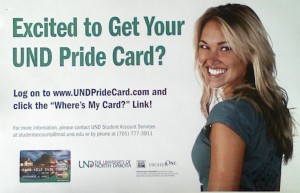University of North Dakota will continue debit card partnership despite ‘unconscionable’ activities

By Rob Port | Watchdog.org North Dakota Bureau
DECEPTIVE PRACTICES: This ad promotes the UND Pride card, a debit card for excess financial aid dollars issued in partnership with HigherOne. That company has settled a class-action lawsuit over excessive fees and deceptive practices in dealing with students, and a partner bank has been sanctioned for those practices in Illinois.
GRAND FORKS, N.D. — In 2009 the University of North Dakota decided, over protests from students, to partner with HigherOne to distribute excess financial aid dollars to students on debit cards.
Now a $15-million settlement of class=action lawsuit has one student leader saying “told you so” even as the school’s administration says they’ll continue their partnership with the company.
HigherOne allows students to get their excess financial aid on a debit card, a service for which the company charges them fees. Some UND students weren’t happy with that arrangement, saying HigherOne was difficult to work with and charged unreasonable fees. Students in other states agreed, and filed a class-action lawsuit against the company over its practices.
Now a settlement has been reached in that lawsuit, and some UND students may be eligible for a payout.
‘Unconscionable’
One of the notices of settlement provided to Watchdog.org by a UND student who wished to remain anonymous states HigherOne “did not adequately disclose the refund disbursement methods available to students for their tuition and financial aid refunds” and that the company “charged inadequately disclosed and otherwise improper fees, such as PIN Based Transaction Fees and Non-Higher One ATM Fees, for use of OneAccounts.”
In a November 2013 statement to Inside Higher Ed, a HigherOne spokesperson denied the plaintiff’s accusations in the lawsuit, but wouldn’t rule out an admission of wrongdoing once the settlement is approved.
Yet a partner in HigherOne’s student debit card service has been sanctioned for the practices alleged in the lawsuit. The Illinois Department of Financial and Professional Regulation has fined Cole Taylor Bank of Chicago $3.5 million for engaging in deceptive practices.
“It is unconscionable for any company to seek profit by misleading customers about the terms of their financial accounts,” Manuel Flores, acting secretary of the IDFPR, said in a news release announcing the ruling on July 1. “Too many students and their families end up with a massive burden of education debt, so it is especially important to protect students from deceptive practices. I’m gratified by our efforts to protect these students’ finances by holding a bank accountable for its unlawful business conduct.”
‘Told you so’
When UND chose to partner with HigherOne, officials were certain the arrangement would serve students well.
“There’s pressure from a group of very vocal students that we should throw this out,” Associate Vice President of Finance and Operations Peggy Lucke told Ryan Johnson, a reporter for the Dakota Student, in 2008 while the partnership was being debated on campus . “If we could work together and try to make it work and make it work better, I think that is the way we serve students.”
But students were skeptical.
“That’s really just not the best thing to be doing with our financial aid,”Shane Gerbert, who helped lead the campaign against HigherOne at the University of North Dakota, told the Washington Post in 2010. “They’re siphoning it away little by little.”
Asked to comment on the latest developments with HigherOne’s offerings, Gerbert said he wasn’t surprised.
“Our vocal group knew this back in 2008, when it came out,” Gerbert, who has since graduated from UND, told Watchdog.org. “Giving our information and bank accounts over to a third party was a bad idea then, and now. With this newest development, the simple response is ‘we told you so’.”
University will continue relationship
But UND spokesman Peter Johnson defended the ongoing relationship with HigherOne, saying students aren’t required to use the company’s services.
“It is important to understand that students can choose any bank to handle their money — they are not required to use a HigherOne account for their banking needs,” Johnson told Watchdog.org in an email. “In fact, we suggest to students that they use any bank accounts that they already have in place. Those students who choose to establish a HigherOne bank account do so of their own free will.”
Asked what steps UND has taken to ensure that HigherOne is treating students fairly, Johnson said the university has “asked Higher One to make sure our students are treated fairly.”
“Again, UND students are not required to use Higher One for their banking needs; they can use any bank,” Johnson said. ” The University of North Dakota has no control over what banks charge.”
Johnson said UND has no plans to discontinue their partnership with HigherOne, and stated that the university receives no revenue from the arrangement.







